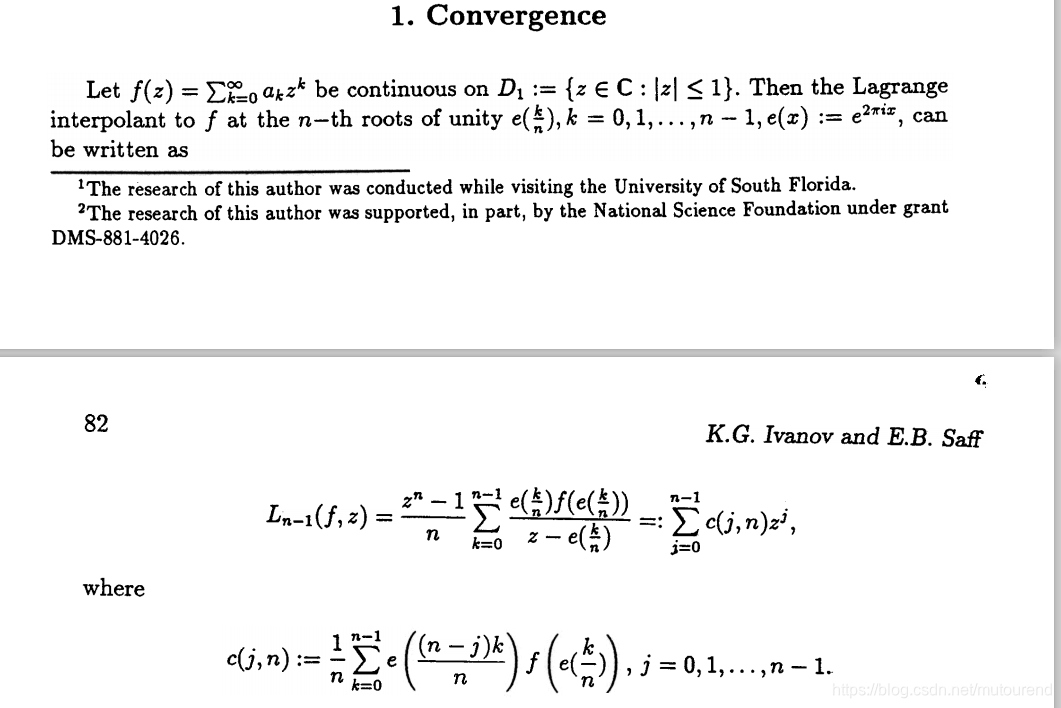libsnark\depends\libfqfft\libfqfft\evaluation_domain\domains\basic_radix2_domain_aux.tcc中的_basic_radix2_evaluate_all_lagrange_polynomials(…)函数的计算依据为《Behavior of the Lagrange Interpolants in the Roots of unity》论文中如下图的公式:

根据论文公式,令w=e(1m)=ej∗2∗πm=cos(2∗πm)+j∗sin(2∗πm)w=e(\frac{1}{m})=e^{j*\frac{2*\pi}{m}} =cos(\frac{2*\pi}{m}) + j * sin(\frac{2*\pi}{m})w=e(m1)=ej∗m2∗π=cos(m2∗π)+j∗sin(m2∗π)
⇓\Downarrow⇓
Lm−1(f,z)=zm−1m∗∑k=0n−1wk∗f(wk)z−wkL_{m-1}(f,z) =\frac{z^m-1}{m}*\sum_{k=0}^{n-1}\frac{w^k*f(w^k)}{z-w^k} Lm−1(f,z)=mzm−1∗k=0∑n−1z−wkwk∗f(wk)
令z=tz=tz=t,可以推导出:
u[k]=tm−1m∗wk∗1t−wku[k]=\frac{t^m-1}{m} * w^k * \frac{1}{t-w^k}u[k]=mtm−1∗wk∗t−wk1
S[k]=f(wk)S[k]=f(w^k)S[k]=f(wk)
使得 Lm−1(f,t)=u⋅SL_{m-1}(f,t) =u·SLm−1(f,t)=u⋅S(点乘)
/**
* Compute the m Lagrange coefficients, relative to the set S={omega^{0},...,omega^{m-1}}, at the field element t.
*/
template<typename FieldT>
std::vector<FieldT> _basic_radix2_evaluate_all_lagrange_polynomials(const size_t m, const FieldT &t)
{
if (m == 1)
{
return std::vector<FieldT>(1, FieldT::one());
}
if (m != (1u << libff::log2(m))) throw DomainSizeException("expected m == (1u << log2(m))");
const FieldT omega = libff::get_root_of_unity<FieldT>(m);
std::vector<FieldT> u(m, FieldT::zero());
/*
If t equals one of the roots of unity in S={omega^{0},...,omega^{m-1}}
then output 1 at the right place, and 0 elsewhere
*/
if ((t^m) == (FieldT::one()))
{
FieldT omega_i = FieldT::one();
for (size_t i = 0; i < m; ++i)
{
if (omega_i == t) // i.e., t equals omega^i
{
u[i] = FieldT::one();
return u;
}
omega_i *= omega;
}
}
/*
Otherwise, if t does not equal any of the roots of unity in S,
then compute each L_{i,S}(t) as Z_{S}(t) * v_i / (t-\omega^i)
where:
- Z_{S}(t) = \prod_{j} (t-\omega^j) = (t^m-1), and
- v_{i} = 1 / \prod_{j \neq i} (\omega^i-\omega^j).
Below we use the fact that v_{0} = 1/m and v_{i+1} = \omega * v_{i}.
// 计算依据见《Behavior of the Lagrange Interpolants in the Roots of unity.pdf》中的Ln-1(f, z)的系数
// S=[f(1),f(w),f(w^2),....,f(w^m-1)]
*/
const FieldT Z = (t^m)-FieldT::one();
FieldT l = Z * FieldT(m).inverse();
FieldT r = FieldT::one();
for (size_t i = 0; i < m; ++i)
{
u[i] = l * (t - r).inverse();
l *= omega;
r *= omega;
}
return u;
}




 本文详细解析了libsnark库中基于《Behavior of the Lagrange Interpolants in the Roots of unity》论文的Lagrange插值算法实现。重点介绍了_radix2_evaluate_all_lagrange_polynomials函数,该函数用于计算相对根集S={omega^{0}
本文详细解析了libsnark库中基于《Behavior of the Lagrange Interpolants in the Roots of unity》论文的Lagrange插值算法实现。重点介绍了_radix2_evaluate_all_lagrange_polynomials函数,该函数用于计算相对根集S={omega^{0}
















 3249
3249

 被折叠的 条评论
为什么被折叠?
被折叠的 条评论
为什么被折叠?








